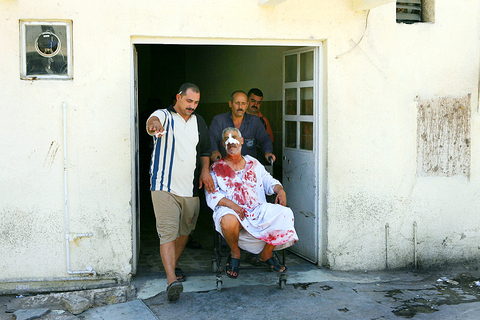Iraqi officials plan to dig a series of trenches around Baghdad in the coming weeks to seal it off and control movement into and out of the city, the New York Times reported yesterday.
The Baghdad anti-terror trench is intended to curb attacks such as the two suicide car bombings yesterday morning that killed at least 11 people and wounded 20 more.
"We're going to build a trench around Baghdad" -- a distance measuring about 97km -- "so we can control the exits and entrances so people will be searched properly," Brigadier General Abdul Karim Khalaf told the Times on Friday in an interview.

PHOTO: AP
"The idea is to get the cars to go through the 28 checkpoints that we set up," the newspaper quoted him as saying.
US officials have approved of the plan, which has been in the works for weeks, the Times said. It calls for cars to be funneled through the checkpoints along the main arteries leading out from the capital, and for smaller roadways to be closed. The trenches themselves would run through farmland or other open land to prevent evasions of the checkpoints, the newspaper said.
The Washington Post, quoting a US military spokesman in Baghdad, said yesterday that checkpoints would be placed along key arteries in and out of Baghdad to ensure that people move through "predictable paths" that can be controlled.
Traffic patterns are being studied and if the plan's outer perimeter is effective some current checkpoints inside the city's borders could be closed to help traffic move along, the Times story said.
The Iraqi official said he did not know the expected cost of the ambitious project, which follows a US-backed security program that set up traffic checkpoints throughout the capital but failed to quell escalating sectarian violence between Sunnis and Shiites.
last month, a new tactic involved moving troops into trouble zones and conducting block by block searches before leaving battalions behind to bolster local residents. That program is expanding into eastern neighborhoods, the Times said.

ACTION PLAN: Taiwan would expand procurement from the US and encourage more companies to invest in the US to deepen bilateral cooperation, Lai said The government would not impose reciprocal tariffs in retaliation against US levies, President William Lai (賴清德) said yesterday, as he announced five strategies to address the issue, including pledging to increase Taiwanese companies’ investments in the US. Lai has in the past few days met with administrative and national security officials, as well as representatives from various industries, to explore countermeasures after US President Donald Trump on Wednesday last week announced a 32 percent duty on Taiwanese imports. In a video released yesterday evening, Lai said that Taiwan would not retaliate against the US with higher tariffs and Taiwanese companies’ commitments to

‘SPECIAL CHANNEL’: Taipei’s most important tasks are to stabilize industries affected by Trump’s trade tariffs and keep negotiations with Washington open, a source said National Security Council Secretary-General Joseph Wu (吳釗燮) arrived in the US for talks with US President Donald Trump’s administration, a source familiar with the matter said on Friday. Wu was leading a delegation for a meeting known as the “special channel,” the Financial Times reported earlier. It marked Trump’s first use of the channel since returning to the White House on Jan. 20. Citing a source familiar with the matter, the Financial Times reported that Minister of Foreign Affairs Lin Chia-lung (林佳龍) was also a part of the delegation. The visit came days after China concluded war games around Taiwan and amid Trump’s

CHIP EXCEPTION: An official said that an exception for Taiwanese semiconductors would have a limited effect, as most are packaged in third nations before being sold The Executive Yuan yesterday decried US President Donald Trump’s 32 percent tariff on Taiwanese goods announced hours earlier as “unfair,” saying it would lodge a representation with Washington. The Cabinet in a statement described the pledged US tariffs, expected to take effect on Wednesday next week, as “deeply unreasonable” and “highly regrettable.” Cabinet spokeswoman Michelle Lee (李慧芝) said that the government would “lodge a solemn representation” with the US Trade Representative and continue negotiating with Washington to “ensure the interests of our nation and industries.” Trump at a news conference in Washington on Wednesday announced a 10 percent baseline tariff on most goods

HELPING HAND: The steering committee of the National Stabilization Fund is expected to hold a meeting to discuss how and when to utilize the fund to help buffer the sell-off The TAIEX plunged 2,065.87 points, or 9.7 percent, to close at 19,232.35 yesterday, the highest single-day percentage loss on record, as investors braced for US President Donald Trump’s tariffs after an extended holiday weekend. Amid the pessimistic atmosphere, 945 listed companies led by large-cap stocks — including Taiwan Semiconductor Manufacturing Co (TSMC, 台積電), Hon Hai Precision Industry Co (鴻海精密) and Largan Precision Co (大立光) — fell by the daily maximum of 10 percent at the close, Taiwan Stock Exchange data showed. The number of listed companies ending limit-down set a new record, the exchange said. The TAIEX plunged by daily maxiumu in just